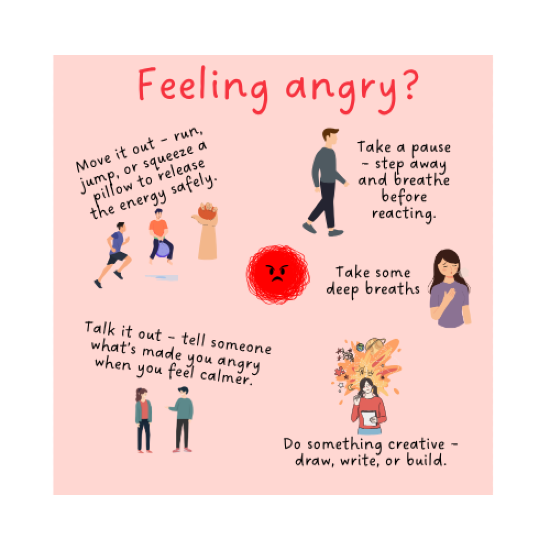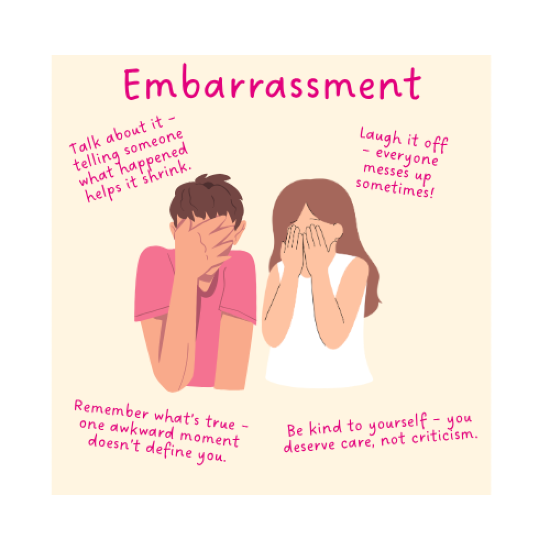More feelings files
Anger
It’s OK to feel angry — it’s what you do with that feeling that matters.
Anger is a strong feeling that everyone has sometimes.
It can show up when something feels unfair, when you get hurt, or when things don’t go your way.
You might notice:
- Your face feels hot or red
- Your heart beats fast
- You want to shout, cry, or slam a door
These are your body’s ways of saying, “I need to calm down!”
Anger itself isn’t bad — it’s how we use it that counts.
You can:
- Take a pause – step away and breathe before reacting.
- Move it out – run, jump, or squeeze a pillow to release the energy safely.
- Do something creative – draw, write, or build.
- Talk it out – tell someone what’s made you angry when you feel calmer.
If you get angry a lot or find it hard to calm down, that’s OK — it just means you might need a bit of extra support. Talking to a trusted adult can really help you work out what’s going on underneath.

Anger
Anger is a normal emotion — learning to manage it helps you stay in control.
Anger often shows up when we feel hurt, embarrassed, powerless, or disrespected.
It’s part of your body’s “fight or flight” response — designed to protect you.
You might notice:
- Tight muscles or a racing heartbeat
- Wanting to shout or lash out
- Thoughts like “It’s not fair!” or “I’ve had enough!”
It’s OK to feel angry — but reacting on impulse can make things worse.
Try noticing your early warning signs and using strategies to cool down before things boil over:
- Breathe deeply or count slowly to 10.
- Step away from the situation until you’ve calmed down.
- Move your body — walk, run, punch a pillow, or listen to music.
- Write or talk about what’s underneath the anger — often there’s another feeling hiding there.
If anger starts to affect your friendships, school, or home life, it’s worth talking to someone.
You can get support through your school, a youth worker, or online services like Kooth or Childline
Learning to handle anger doesn’t mean hiding it — it means finding ways to express it that don’t hurt you or anyone else.

Loneliness
Everyone feels lonely sometimes — even when they’re not alone.
Feeling lonely doesn’t mean there’s something wrong with you.
It just means you’re missing connection — maybe friends, family time, or people who “get you.”
You might feel:
- Left out or invisible
- Like no one understands you
- Sad, quiet, or like you don’t belong
It’s OK to feel this way. Lots of people do.
The good news is — there are ways to feel more connected again.
You could:
- Talk to someone you trust about how you feel — it helps to share it.
- Say hello or smile at someone — small things can start new friendships.
- Join in with clubs, sports, or hobbies where you can meet others.
- Be kind to yourself — loneliness doesn’t last forever, even if it feels that way.
If you feel lonely a lot or really sad, please talk to an adult you trust or visit Childline for help and ideas.

Loneliness
Loneliness can happen to anyone — even people who look confident or surrounded by friends.
Loneliness isn’t just being on your own — it’s feeling disconnected or unseen.
It can happen after a change (like moving school or losing a friendship), or even when you’re around people who don’t really get you.
You might notice:
- Feeling distant, invisible, or left out
- Thinking no one really understands
- Wanting to be around people, but not knowing how to start
- Loneliness can feel painful, but it can change — and reaching out is the best first step.
You could try:
- Talking to someone you trust — sometimes one honest conversation can make a big difference.
- Finding your people — join a club, online group, or community that shares your interests.
- Doing something kind — helping others builds connection too.
- Getting outside — fresh air and movement help your mind reset.
If loneliness has been around for a while or makes you feel hopeless, reach out for support — from school, a GP, or online at Kooth or Childline.
You’re not the only one feeling this way, and you can find your place again.

Embarrassment and Shame
Everyone feels embarrassed sometimes — and it always feels bigger in the moment than it really is.
We all do things that make us blush, go quiet, or want to hide under the duvet!
Feeling embarrassed is totally normal — it’s part of learning and growing.
Sometimes embarrassment can turn into shame, which is when you start thinking, “I’m bad” instead of “I made a mistake.”
But remember: you are never bad just because you made a mistake.
You might notice:
- A hot or red face
- Wanting to disappear or be alone
- Thinking about what happened again and again
Here are some ways to help:
- Talk about it – telling someone what happened helps it shrink.
- Laugh it off – everyone messes up sometimes!
- Remember what’s true – one awkward moment doesn’t define you.
- Be kind to yourself – you deserve care, not criticism.
When you talk about it or give it time, that horrible feeling fades. You’re still you.

Embarrassment and Shame
Feeling embarrassed or ashamed doesn’t mean something’s wrong with you — it means you care about how others see you.
Embarrassment happens when we think others are judging us — maybe we said something awkward, got something wrong, or stood out when we didn’t mean to.
It’s a normal part of growing up and learning who you are.
Shame can feel stronger — like believing you’re the problem rather than something you did. It can make you want to hide or go quiet.
But here’s the truth: everyone makes mistakes, and you still deserve respect and kindness — especially from yourself.
You might notice:
- Feeling hot, tense, or small
- Overthinking what others think of you
- Avoiding people or situations afterward
Try to:
- Talk about it – sharing it with someone you trust often helps it lose its power.
- Challenge the thought – would you judge a friend for the same thing? Probably not.
- Forgive yourself – being human means sometimes getting it wrong.
- Learn and move on – mistakes are how we grow, not proof we’ve failed.
If shame sticks around or starts affecting your confidence or self-worth, talk to someone — it’s a heavy feeling that gets lighter when shared
